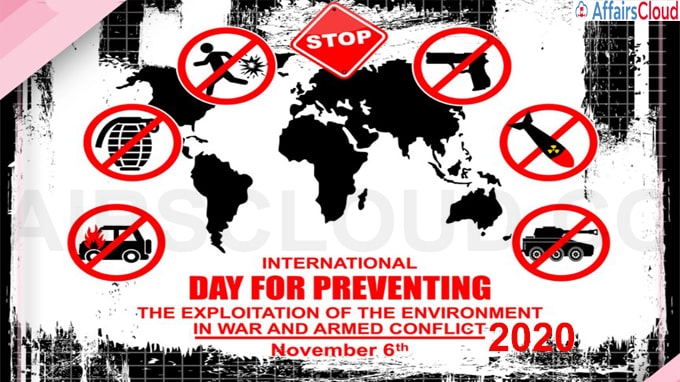 United Nations(UN)’s International Day for Preventing the Exploitation of the Environment in War and Armed Conflict is annually observed across the globe on 6th November to create and raise awareness on the need to protect the environment during armed conflicts.
United Nations(UN)’s International Day for Preventing the Exploitation of the Environment in War and Armed Conflict is annually observed across the globe on 6th November to create and raise awareness on the need to protect the environment during armed conflicts.
Aim:
To reduce the effects of armed conflicts on the environment and promote methods to prevent the exploitation of Environment (pollution of water wells, forest fire, deforestation, poisoning of soils and others) to gain military advantage.
Background:
The United Nations General Assembly (UNGA) adopted the resolution A/RES/56/4 on 5th November 2001, and proclaimed the 6th November of every year as the International Day for Preventing the Exploitation of the Environment in War and Armed Conflict to safeguard nature for the sake of future generation and protect the environment.
Efforts to Protect Environment and Promote Peacebuilding:
i.The United Nations Environment Assembly(UNEA) adopted the resolution UNEP/EA.2/Res.15 on 27th May 2016 and recognizes the role of a healthy ecosystems and sustainably managed resources in reducing the risk of armed conflicts.
ii.As a part of conflict prevention and peacebuilding programmes, 6 agencies and department of the UN (United Nations Environment Programme (UNEP), United Nations Development Programme (UNDP), UNHABITAT, United Nations Peacebuilding Support Office (PBSO), Department of Political Affairs(DPA) and Department of Economic and Social Affairs (DESA) ) coordinated by the UN Framework team for Preventive action, partner with the European Union(EU) to support the member nations to identify, prevent and transform the tension over natural resources.
iii.The Environmental Law Institute (ELI), UNEP and the Universities of Tokyo and McGill initiated a 4-year global research programme to collect good practices on managing natural resources during post-conflict peacebuilding. This represents a collection of experiences, analyses and lessons in managing natural resources to support post-conflict peacebuilding.
Key Points:
i.UNEP noted that around 40% of all the internal conflicts in the past 60 years are associated with the exploitation of natural resources.
ii.It also found that conflicts related to the natural resources are to be twice as likely to recur.
UNEP stated that the wars in Afghanistan, Colombia or Iraq have affected their natural resources and Afghanistan has faced a drastic increase in deforestation and some regions of the country have reported deforestation rate of around 95%.
iii.The countries affected by the conflicts are less likely to achieve the targets of Sustainable development goals and by 2030 more than 80% of the world’s poorest population are concentrated in the region affected by conflicts and violence.
About United Nations Environment Programme (UNEP):
Executive Director– Inger Andersen
Headquarter– Nairobi, Kenya




